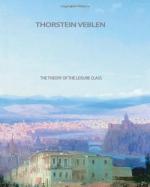
|
| Name: _________________________ | Period: ___________________ |
This test consists of 5 multiple choice questions, 5 short answer questions, and 10 short essay questions.
Multiple Choice Questions
1. What happens when men come into wealth through peaceful means?
(a) Property becomes an indicator of success.
(b) Property becomes the subject of competition and warfare.
(c) Property becomes an indicator of heritage.
(d) Property becomes the measure of spiritual values.
2. To whom does the requirement of excessive clothing apply most?
(a) Owners.
(b) Children.
(c) Servants.
(d) Women.
3. What allowed a leisure class to emerge?
(a) Exploitation of workers.
(b) Differentiation and specialization of labor.
(c) Improvements in production efficiency.
(d) Expansion of the military.
4. What does Veblen say possessions indicate in an ownership society?
(a) The power of the possessor.
(b) The virtue of the possessor.
(c) The nobility of the possessor.
(d) The fame of the possessor.
5. What does Veblen say makes wealth desirable?
(a) It provides happiness.
(b) It resolves disputes.
(c) It is honorable.
(d) It gives renown.
Short Answer Questions
1. What factors drove the emergence of the leisure class?
2. What does Veblen say was the earliest form of ownership?
3. What are signs of vicarious consumption?
4. How does Veblen say wealth is obtained?
5. What standard does Veblen say guides people's behavior?
Short Essay Questions
1. What was the earliest form of ownership?
2. How are lawns and public grounds evidence of pecuniary beauty?
3. What is emulation, and how does it function in society?
4. How does Veblen define leisure?
5. How does Veblen describe the differences between the sexes and the effect of those differences on economic life of a society?
6. How are churches and ornate buildings related to conspicuous waste?
7. How does the leisure class view work?
8. How has the leisure class evolved from the times of hunting cultures?
9. How does the individual consumer think of his conspicuous waste?
10. How are habits formed?
|
This section contains 681 words (approx. 3 pages at 300 words per page) |

|




